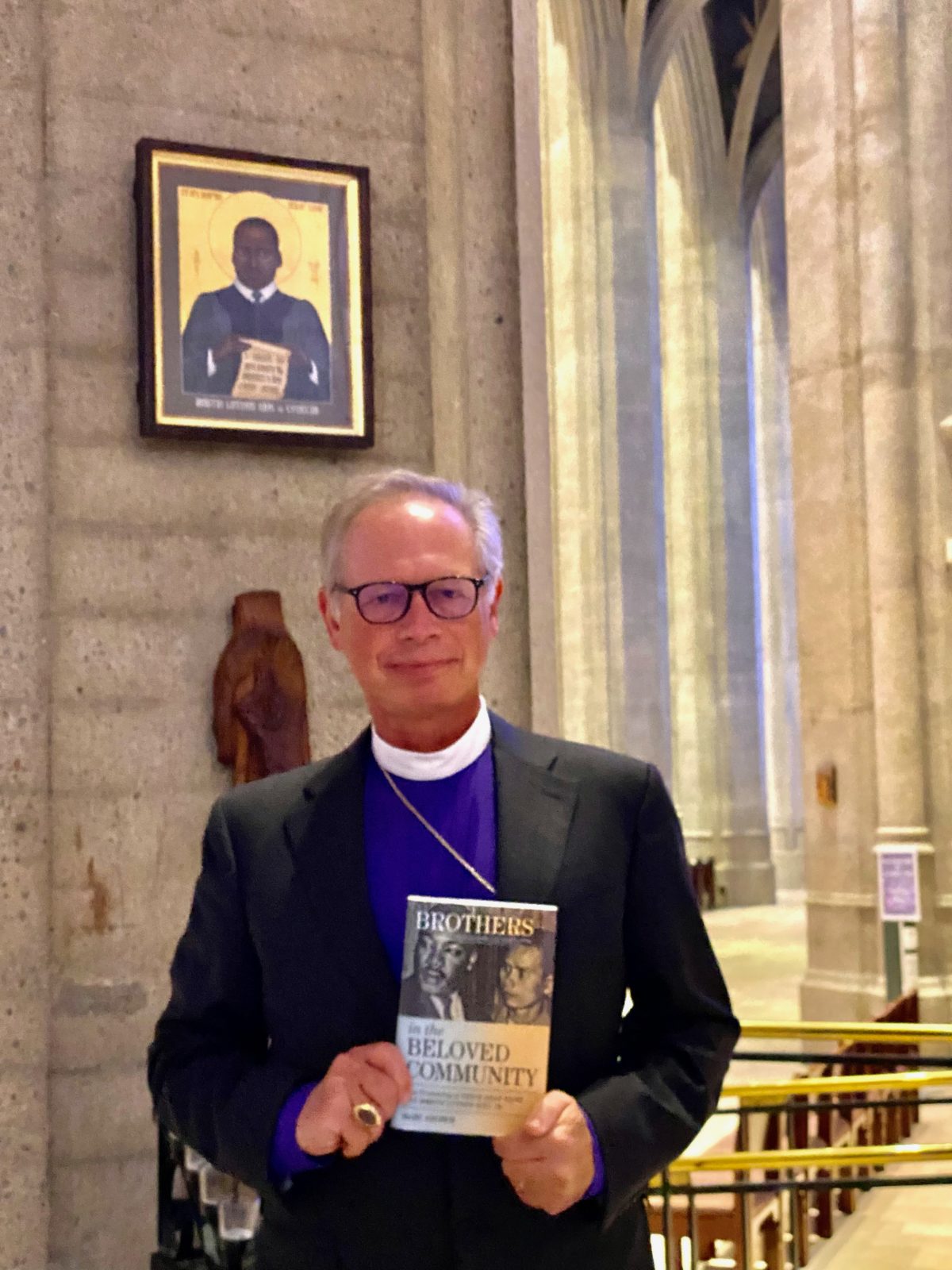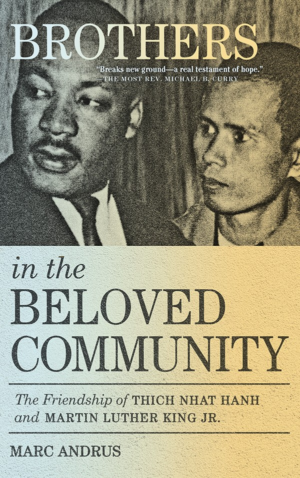In celebration of the release of Brothers in the Beloved Community, author Rev. Marc Andrus sat down and answered some questions around Thich Nhat Hanh, Martin Luther King Jr. and the friendship that changed them and the world.
The Rt. Rev. Dr. Marc Handley Andrus is the author of the newly released Brothers in the Beloved Community and the eighth bishop of the Episcopal Diocese of California, elected in 2006 following ministry as the Bishop Suffragan in Alabama. Raised among the hills and lakes of East Tennessee, Marc developed an early love for the beauty of the Earth, and a call to protect it. His activism, grounded in contemplative prayer, has focused on the rights of vulnerable peoples, environmental justice, and climate change. Marc has led the Episcopal delegation to the UN Climate Conferences several times since 2015. He coauthored the award-winning publication Stations of the Cosmic Christ with the Rev. Dr. Matthew Fox. Marc lives in San Francisco with his wife, Sheila.
Thich Nhat Hanh and Martin Luther King Jr. were both very influential figures, yet it would seem that not many people today have heard of their concept of the Beloved Community. Can you tell us some ways that the Beloved Community lives on today?
Rev. Marc Andrus: First, we can see that the Beloved Community lives on the lives of people who have directly received the transmission of teaching about it from a teacher—particularly King and Nhat Hanh. The late Representative John Lewis would be a great example of such a person who upheld the Beloved Community throughout his long and brilliant legislative and activist career. The Episcopal Church’s Presiding Bishop, Michael Curry, is another example. Then, it is also true that anyone who is loyal to the principles of the Beloved Community, even without knowing it by that name, is indeed a citizen of the Beloved Community. Some of those central principles are the recognition of the basic interconnectedness of all life, and the resultant respect for all life: peace, justice, and love.
How did these phenomenal men shape each other’s concept of community? How do you see Dr. King’s influence in how Thich Nhat Hanh taught?
Rev. Marc Andrus: Thich Nhat Hanh helped cement Dr. King’s growing sense of living, as he put it, in the “World House.” Nhat Hanh personified the global diversity that King increasingly recognized as being his “relations.” This is why I’ve titled the book Brothers in the Beloved Community. The relationships within the Beloved Community are more those of family members than of collaborators or partners in a common effort. For Thich Nhat Hanh, the lesson that Dr. King taught about the Beloved Community had to do with overcoming fear and caution about relating to Christianity. Through King (and others, such as Thomas Merton) a broader community opened up to him.
In the book you mention that Martin Luther King Jr., faced criticism for his strong commitments to international peace and economic justice. You further state that abandoning those commitments “would amount to a betrayal of the Beloved Community.” Why is that? And how does the Beloved Community balance local and universal issues?
Rev. Marc Andrus: Unlike the commonest conception of the balance between local and universal loyalties, being loyal to the Beloved Community does not mean abandoning your original, more localized loyalties. Prominently, King never moved on from his commitment to racial justice, he just widened his commitments. One great lesson from this somewhat against-the-grain reality of the Beloved Community is that we have greater capacity for love and loyalty than we think we do.
You discuss the importance of Thich Nhat Hanh’s statements on Nirvana-in-this-world to the Beloved Community. How is the Beloved Community’s expression of universal love grounded in the everyday?
Rev. Marc Andrus: Universal love is completely part of the everyday! Or, rather, if you can’t find overflowing love and look to some abstract notion of love in the Cosmos, you are relating to a mirage of love. The everyday is the gateway to the infinite and the universal.
How has this new knowledge of their friendship shifted your perceptions of Martin Luther King and Thich Nhat Hanh?
Rev. Marc Andrus: I began to see both as warmer, more human and intimate, through learning about their friendship.
One great lesson from this somewhat against-the-grain reality of the Beloved Community is that we have greater capacity for love and loyalty than we think we do.
Rev. Marc Andrus.
What were some of the biggest surprises in your research?
Rev. Marc Andrus: There were so many surprises in the research that led to Brothers in the Beloved Community! Perhaps the biggest was the discovery that Thich Nhat Hanh not only believes that great bodhisattvas endure past death, helping us all in our everyday lives, but that he has felt King’s loving support through all these years after King’s death in 1968.
In getting more acquainted with Thich Nhat Hanh while researching this book, what was your deepening dialogue with Buddhism and mindfulness like?
Rev. Marc Andrus: I learned that Thich Nhat Hanh brought an important feature from his lineage of Buddhism into the theoretical understanding of the Beloved Community. A central feature of the Beloved Community is the conscious quality of interconnectedness; Thich Nhat Hanh brought the further idea that the whole is found in every part of the whole. He calls this interbeing. In your heart, then, the whole universe is present.
How has what you have learned from writing this book influenced how you preach today?
Rev. Marc Andrus: The idea comes from Brian Swimme and Thomas Berry, but it gained power in my thought from my research on the Beloved Community; that is, the desire of the universe is to connect. What I’ve learned about my preaching is that looking people in the eye, bringing my authentic self into the sermon space is every bit as important as the theology conveyed. We are all hoping to overcome estrangement in our worlds. If we can connect for even a few minutes in a sermon, we may have the hope we need to heal broken relationships in our lives.
I hope this interview has you excited to explore this friendship and the beloved community being built.
The Rt. Rev. Dr. Marc Handley Andrus is the eighth bishop of the Episcopal Diocese of California, elected in 2006 following ministry as the Bishop Suffragan in Alabama. Raised among the hills and lakes of East Tennessee, Marc developed an early love for the beauty of the Earth, and a call to protect it. His activism, grounded in contemplative prayer, has focused on the rights of vulnerable peoples, environmental justice and climate change. Marc has led the Episcopal delegation to the UN Climate Conferences several times since 2015. He co-authored the award-winning publication Stations of the Cosmic Christ with the Rev. Dr. Matthew Fox. Marc lives in San Francisco with his wife, Sheila.

